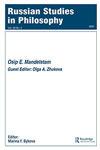弗拉基米尔·米罗诺夫给亚历山大·米哈伊洛夫斯基的信
IF 0.1
4区 哲学
Q4 Arts and Humanities
引用次数: 0
摘要
我亲爱的亚历山大!我终于找到了一些安静的时间,慢慢地、专心地阅读你的文章《黑色笔记本的开端》。我非常喜欢这篇文章,尤其是你对海德格尔难以理解的哲学的真正独立的立场。鉴于你之前关于俄罗斯接受海德格尔哲学的特点的文章,我想首先在这里提供一些解释,特别是我们自己的立场。我们在你的最新文章中反复强调了这一点,即海德格尔并不是简单地谈论未来,而是以一种刻意神秘的方式这样做,这样“目标受众就会理解”。在我们的第二篇文章中(我承诺会给你一份硬拷贝),我们再次提请注意这一点,并注意到他的立场比战后德国许多开始从事“意识形态自我净化”的人更为诚实和一致。雅斯贝尔斯的情况同样不那么简单,因为他在这方面不是一个“清晰”的人物。在某种程度上,我们或多或少地认为他在离开之前在海德格尔的处境中扮演了一种骗子的角色。但这是一个单独的问题。与此同时,我们一再规定,我们对海德格尔的立场不感兴趣,而是对哲学家发现自己与权力结构一致的情况进行评估。这显然仍然是我们这个时代的一个相关问题。海德格尔的例子在这里很有启发性,因为它表明,即使是最伟大的思想家,无论他如何将自己封闭在自己的哲学思考中,仍然可以作为一种手段。当然,这对他的哲学思想的伟大和他发展的思想都没有影响。另一个问题是,考虑到世界的运作方式,无论我们与肤浅的读者保持多大的距离,他们都会一直存在,并且可以选择我们的论点中适合他们的。The Black本文章由计算机程序翻译,如有差异,请以英文原文为准。
Letter from Vladimir V. Mironov to Aleksandr V. Mikhailovsky
My dear Aleksandr! I have finally found some quiet time for a slow and attentive read of your article “The Beginning of the Black Notebooks.” I very much liked the article, especially for your truly independent position on Heidegger’s difficult-tounderstand philosophy. Given your previous article on the features of Russian reception of Heidegger’s philosophy, I would like to start by providing a few explanations here, particularly of our own position. We have repeatedly highlighted the very point that comes up in your latest article, that Heidegger does not simply address the future, but does so in a deliberately enigmatic fashion, such that “the intended audience will understand.” In our second article (which I promised to give you a hard copy of), we once again draw attention to this and note that his position is more honest and consistent than that of many of those in postwar Germany who began engaging in “ideological selfpurification.” The case with Jaspers is likewise not so simple, as he is no “crystal-clear” figure in this regard. At some point we more or less suggested that he played a kind of trickster role in the Heidegger situation before stepping aside. But this is a separate issue. At the same time, we have repeatedly stipulated that we are not interested in Heidegger’s position as such but in assessing situations where philosophers find themselves aligning with the power structure. And this has clearly remained a relevant issue for our own time. The example of Heidegger is highly instructive here, since it shows that even the greatest of thinkers, however much he may sequester himself inside his own philosophical reflections, can still be used as a means. And, naturally, this has no effect on the greatness of his philosophical thought nor the ideas he developed. Another issue is that, given the way the world works, no matter how much we may distance ourselves from superficial readers, they will always exist and can pick and choose whichever of our arguments suits them. The Black
求助全文
通过发布文献求助,成功后即可免费获取论文全文。
去求助
来源期刊

RUSSIAN STUDIES IN PHILOSOPHY
PHILOSOPHY-
CiteScore
0.10
自引率
0.00%
发文量
14
期刊介绍:
Russian Studies in Philosophy publishes thematic issues featuring selected scholarly papers from conferences and joint research projects as well as from the leading Russian-language journals in philosophy. Thematic coverage ranges over significant theoretical topics as well as topics in the history of philosophy, both European and Russian, including issues focused on institutions, schools, and figures such as Bakhtin, Fedorov, Leontev, Losev, Rozanov, Solovev, and Zinovev.
 求助内容:
求助内容: 应助结果提醒方式:
应助结果提醒方式:


